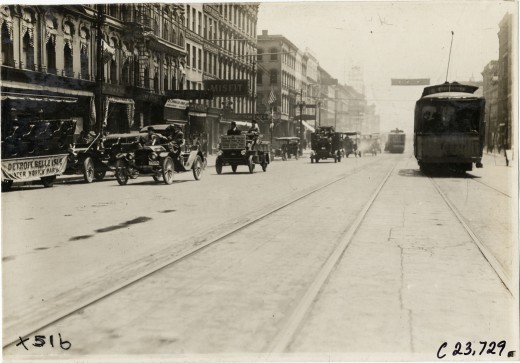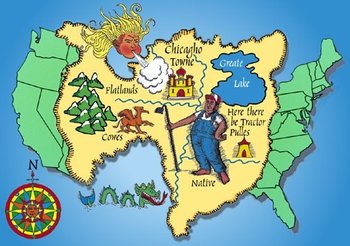The Internet's Greatest Secret (and What It Means for Your Business)

When we think of the Internet's secrets, we tend to think mainly of the Deep Web, or its scarier form, the Dark Web. The surface Web we use is only the tip of a much larger iceberg that extends far below the waterline and threatens to sink any ships that venture too close. The Deep Web is a world of borderline criminality (supposedly) and grey hat dealings done secretly through virtual private networks that hide visitors' identities from any possible spies that lurk there. The Dark Web is an even scarier world. Little is known of the Deep Web, and nothing is certain about the Dark Internet; those who claim to have visited tell terrifying tales of depravity that would horrify the most infamous serial murderers and dictators, and I do not wish to discuss these disturbing rumors of appalling sicknesses of the mind and soul that would drive sounder psyches to madness and suicide, assuming that one tenth of them are true. The rumors are real, the secrets are real (what they are is anybody's guess, though), but there is a secret online far greater, and it exists back on the surface Web. It is a world of obscure esoterica, forgotten by time and popular culture, found along the Information back roads that run far afield of the Information Superhighway, farther abroad than most willingly travel.
Welcome to the Flyover Web.

A Historical Parallel
In the nineteenth century, the American Midwest was quickly settled and organized as industrialization and the railroads brought prosperity to the region. Cities such as Cleveland, St. Louis, and Detroit became manufacturing powerhouses in a time of increasing ease and comfort for the everyman, and some of that industrial might spread to smaller towns and villages far afield. Meanwhile, rail transport kept people moving in and out. Travel between the coasts ensured local attention from out-of-staters. Souvenirs were sold in even the smallest villages. That was the nature of travel in those days, at least until the rise of the motorcar, created by a Detroit industrialist, and, more significantly, two Dayton, Ohio brothers who decided to create a flying machine.
With increased popularity for air travel and the creation of the Interstate Highway system in the 1950's, tourist traffic dried up, first in the smaller rural communities, and soon, most visitors were only staying at the city airport a few hours to change flights; only those air passengers with some family connection nearby actually visited. Meanwhile younger generations began speaking of the region with increasing derision as having nothing worth visiting for and saving their tourist time and money for larger and more famous cities nearer the coasts. With time, almost the entire American interior became known as simply "flyover country" of which people only ever saw the barest aerial glimpse en route to someplace else. Thus it remains today.
This is essentially the history of the Internet.

The Online Rust Belt, Or: The Flying Machine that Destroyed the Net
The early Internet was much like the Rust Belt in 1910 but with knowledge. Improved transportation (so to speak) caused it to grow and prosper until, some website creators made exploring the Web so easy that most people simply stopped exploring.
The worst offender was Wikipedia.
I went to university deep in the central Illinois cornfields when Wikipedia came on the scene. Other students at Eastern Illinois University at Charleston (You find that sort of town in flyover country) were quick to exploit this new technology so as to make their research assignments easier and less time-consuming so that they could pour the savings into light beer at dive bars, all the while complaining that Charleston was a really boring college town. It was then, too, that Facebook first became popular, which spread the complaints and fed the love of Wikipedia.
Only the college faculty disliked the Free Encyclopedia. Some even went so far as to ban its use in research projects. The idea was to encourage variation, and I agreed with it. My idea of research was to poke around the old Yahoo! Directory seeking something that struck my fancy and form a thesis and paper around it. My citations were always sure to please my professors; after all, I made sure never to mention Wikipedia on any part of a paper.
I was not a normal student. I refused to drink so as to brag about my superior morals, I often neglected my assigned reading in favor of books that had been buried in the library stacks, unread, for decades (some volumes I read, had never been checked out since the library was actually built), and I spent long hours strolling the streets of the town of Charleston, Illinois proper and gaining a very intimate knowledge of the place. Any mode of learning, I considered, was better than Wikipedia.
Well, time went on, and I began to notice how Internet sites began to grow more and more alike and how, increasingly, I had to actively search for anything distinctive. My favorite pages began disappearing, including the Yahoo! Directory, which made finding new information that much harder. It was a dark age online, rather the way Pittsburgh, PA must have been in the 1970's and 80's after the industry left. The decay of the Internet had a parallel with the decay of towns and cities throughout the Midwest. With Google, Facebook, and Wikipedia invariably at the top of any search, anything else rusted away.

So What Does This Mean?
What Flyover Country is in terms of geography, in location, the Flyover Web is in terms of audience. In the same way that few people know anything about America's heartland because few bother to travel there, few know anything about the Web beyond the largest sites, because few take the trouble to learn.
It all boils down to laziness and reluctance to try anything new. My classmates at Eastern Illinois University had better things to do with their time than find interesting ideas, so they just took everything off Wikipedia and then, freed from their academic duties, immediately went to Facebook. These same students also dismissed the nearby community as boring because it lacked a mall and a lot of big box stores. The kids just did not want to explore the historic Square and its motley collection of unique retailers.
Now that these kids are grown and out of school, the Internet has come to reflect their prejudices. Wikipedia has grown larger than ever. Facebook is the chief social vehicle, and people just do not care to dig a little deeper and find your new website.
It is not that readers cannot find you; it is that they are not looking.
How to Draw Attention to the Flyover Web
I have attempted blogging several times to no avail. It matters little what I intended to write about; what matters is that I quickly lost faith in the value of my writing, and I just could not maintain that faith long enough to make it successful.
The fact is that all new websites, all new webstores, all new blogs, start in the Flyover Web. Even established sites can be banished there later if their audience shrinks enough. That is what happened to MySpace. It was the cool thing to do in the days when social media was a new thing, and it fell when its audience grew too much and drove its original users to the next big thing.
There is a next big thing that Flyover Web sites can use to draw attention to themselves. It is not quite social media, but it is not quite a mere search engine either.
Welcome to Pinterest.
Pinterest is like an online catalog that one can search like Google and browse like the old Yahoo! Directory. One can also trade ideas and material with other users. It is likely the most powerful tool for online promotion yet created, because with Pinterest, you can cast an especially wide net over potential readers so that you can gain the ones who will actually read your material, buy your products, and even subscribe to your blog. This is the goal regardless. Pinterest just makes the process easier.
The best way to use it is to start an account for your business. Then you create your starter boards (that means the same as bulletin boards) around a theme (your chosen niche). Then you search out your starter Pins (That is what all the pictures and graphics are called); at this point you want to draw some attention from other users via the flattering tactic of posting their material. This also serves to make your boards and your profile look much more established.
Then, you want to start getting followers. At this point, you simply use the psychological principle of obligation; you do someone a favor, and most of the time, they shall feel obliged to reciprocate that favor. What you do, specifically, is you follow as many users on a similar topic to yours as you can each day. Then once a week or so, you unfollow anyone who did not follow you back. After several days of this, you are ready to begin pinning your own materials. All the while, you keep following. You want a large following, because most who follow you are indifferent about what you offer. The more you expose yourself to, the more likely someone is receptive to what you offer.
In the beginning of your Pinterest campaign, you also want to win invitations to group boards. These are assembled by multiple users in collaboration, and they have their own followings. The way group boards work is you post your content. This puts it in front of your followers AND the followers of every contributor to the board. This is about the widest net you can cast.
It is all very simple, even if it is very time consuming. Right now, we shall only cover this basic strategy.

Beyond the Information Superhighway
We all know the term Information Superhighway. The idea is that information and ideas can be spread quickly and easily across vast distances. While true, the image of a superhighway is also limited to its immediate surroundings, which tend to be very much the same no matter where you travel.
Hence the very large websites that practically everybody reads. Along the superhighway, one will find all the prime online real estate recognized by all. Meanwhile, there is little space for newcomers, who must set up shop in more fringe locations, beyond the superhighway's reach. Others hold more esoteric interests that place them even further afield. The general rule is that audience shrinks as one strays from the Information Superhighway. The blogger's chief hope now is how the audience that one does win by straying becomes more devoted. Pinterest is the best tool currently available to draw that audience beyond the Information Superhighway.
And once drawn, they shall likely return.








